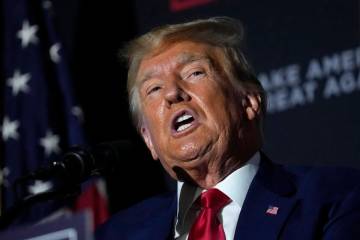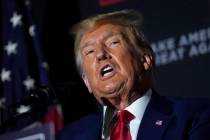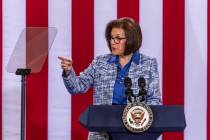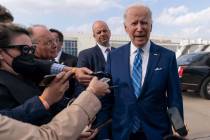COMMENTARY: Donald Trump’s notion that the “people did not share” in government’s wealth is a preposterous platitude.
“For too long, a small group in our nation’s capital has reaped the rewards of government while the people have borne the cost. Washington flourished, but the people did not share in its wealth.”
— President Donald Trump, Jan. 20 inaugural address
Washington is not a swamp.
Since at least the days of Jimmy Carter, presidential politicians have run against Washington, which is — according to the standard indictment — overrun by corrupt politicians, overpaid lobbyists, and self-important media types. Donald Trump is no exception and, indeed, in his sneering description of the nation’s capital as a “swamp,” has done his predecessors one better.
But his portrait is an absurdity. It bears little relationship to two overriding realities.
First, the rewards of government go mostly to “the people” through massive transfer programs such as Social Security. Second, the costs have been borne mainly by the rich and upper middle class, who pay most taxes, and foreign and domestic lenders who cover chronic budget deficits.
It’s true, of course, that many Washington legislators, lobbyists, lawyers and journalists have done well — and there are repeated instances of sleazy lobbying, greed and undeserved wealth. But this bounty affects thousands, not millions, and influence-peddling thrives because Washington distributes so much money to “the people.” The same holds true for protecting popular tax breaks: say, deductions for charitable giving and mortgage interest.
Historically, this wealth transfer is relatively new. As late as the 1950s, 50 percent or more of the federal budget often went to defense. In 2016, the military’s share was 16 percent and declining. In its place have been huge entitlements to groups deemed deserving. When considered together, they totaled $2.4 trillion in 2016 or roughly two-thirds of federal spending, says the Congressional Budget Office.
The figures below for 2012, based on Census Bureau data and provided by the Center on Budget and Policy Priorities, shows how pervasive these transfers are.
— Social Security had 52 million recipients, representing 16.8 percent of the population.
— Medicare had 49 million recipients, or 15.8 percent of the population.
— Medicaid had 83 million recipients, or 26.7 percent of the population.
— The 51 million Americans on food stamps amounted to 16.6 percent of the population.
— Four million people, or 1.2 percent of the population, received food stamps.
When all transfer programs were included and double counting was eliminated (say, food-stamp beneficiaries on Medicaid), about 153 million Americans received some sort of federal benefit in 2012, Census estimated. That was nearly half (49.5 percent) of the then-population. Over a lifetime, the proportion of beneficiaries would be higher, because most older Americans ultimately receive Social Security and Medicare.
About two-thirds of these benefits were “means tested” (with income limits to eligibility) and aimed at the poor. The rest, led by Social Security and Medicare, were open to the broader public and subject to varying eligibility requirements.
Meanwhile, the money to pay for all these benefits comes heavily from high-income households. In 2013, says the CBO, the richest 1 percent of Americans paid 25.4 percent of all federal taxes — mainly income and payroll taxes — and the richest 10 percent (including the top 1 percent) accounted for 53.9 percent of tax revenues. As for buyers of Treasury securities, they are financing government at low interest rates, now about 2.5 percent before inflation on 10-year Treasury notes.
So the notion that the “people did not share” in government’s wealth is a preposterous platitude. It’s the opposite of the truth, which is that Washington has become a gigantic engine of redistribution. If the attendant lobbying sometimes seems chaotic or corrupt — swamp-like — it reflects a democratic system focused on near-term rewards and not long-term dangers. Huge budget deficits, totaling around $9 trillion over the next decade by the CBO’s count, are the most obvious result.
Leaders of both parties have evaded a candid debate on government’s role and limits. What programs need to be reduced or expanded? What taxes need to be raised? Trump did not even mention deficits in his inaugural address. On this issue, he may be as bad as his recent predecessors and, perhaps, worse.
Robert Samuelson writes a column on economic issues for The Washington Post.




























